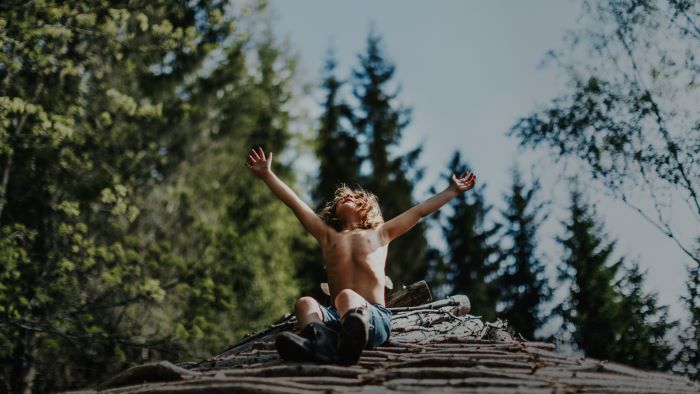Silje Evensmo Jacobsen’s documentary is a lovely, moving portrait of the subtly changing dynamics within a Norwegian family. Maria, Nik, and their four children—Ulv, Falk, Freja, and Ronja—live an idyllic existence on a rambling farm in a woodsy, remote area of Norway. They reside there self-sufficiently, tapping sap from trees and growing their own food. Additionally, the children are homeschooled. Maria, a photographer, is resistant to having them become part of an institution. And suddenly, Maria becomes sick and dies, leaving Nik to take care of the farm and family.
In the press notes, Jacobsen describes the unusual journey of the film. She had reached out to Maria around 2014 after discovering her blog (wildandfree.no), with an interest in making a documentary. Maria welcomed her in, but soon became sick with cervical cancer, and the project was postponed. With their permission, Jacobsen began documenting the family in the wake of Maria’s death in 2019. What emerges is a sensitively drawn, intimate portrait, with some voice-overs from Maria before her life was cut off so abruptly.
Ronja, the eldest, is Maria’s daughter from another marriage. The complicated grief she harbors and the distance she feels from the family, especially after her mother’s death and as she ages out of her teen years, is one focal point. She decides to live with her biological father in town. She also sees a therapist but has trouble communicating her feelings with the family. Ultimately, she ends up writing a touching letter to her younger sister Freja, describing why she has been so detached.
Nik soon realizes the enormity and financial difficulties of taking care of the children and the farm. With great sorrow, he sells it and moves his family to a smaller house and property in a slightly more populated area. Nik, who is English, knows he is unable to properly teach his children sufficiently in Norwegian. He decides to get a job in woodworking to make some money, and also enrolls his children in school. In a compromise with the teachers, the children only attend three times a week. Yet the decision is particularly fraught for Freja, who is shy and has trouble initially making friends. Nik becomes quietly perturbed once he learns Freja is using an iPad to watch TV shows for class. Their household was a no-television zone, and we watch little bits of their former existence slowly becoming tattered.
Jacobsen’s film is very finely tuned. It never sledgehammers its points nor exploits the family’s quiet grief. It probably helps that the family is so largely amicable. The most heated fight is a mild one, stemming from the two young boys messing up Freja’s bed. Nik, who feels like an “alien in Norway,” wants to move back home to England with his brother but concedes to Maria’s wishes and the family’s desire to stay. Jacobsen’s study of him is affecting. In older clips and photos, he is a strapping farmer, glowing with his wife. Now, he is still a patient, loving, supportive father and still handsome, but more wearied, with hollowed-out eyes and scraggly hair.
The film is beautifully shot and smoothly edited, with appealing shots of sun-dappled landscapes. For the animal death adverse, there is an unnerving but evocative scene where Nik shoots a bull in front of the children and skins it for meat to sell. “We give thanks for this bull,” Nik says calmly, “His name was Ferdinand. And he was good. We give thanks for his meat.” It’s a clear-eyed, matter-of-fact way of a farmer’s life that Jacobsen’s documentary captures so well. Her documentary is an elegy for and tribute to Maria, with an optimistic eye toward her family’s future without her.







Leave A Comment